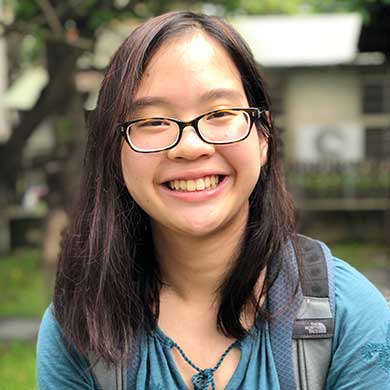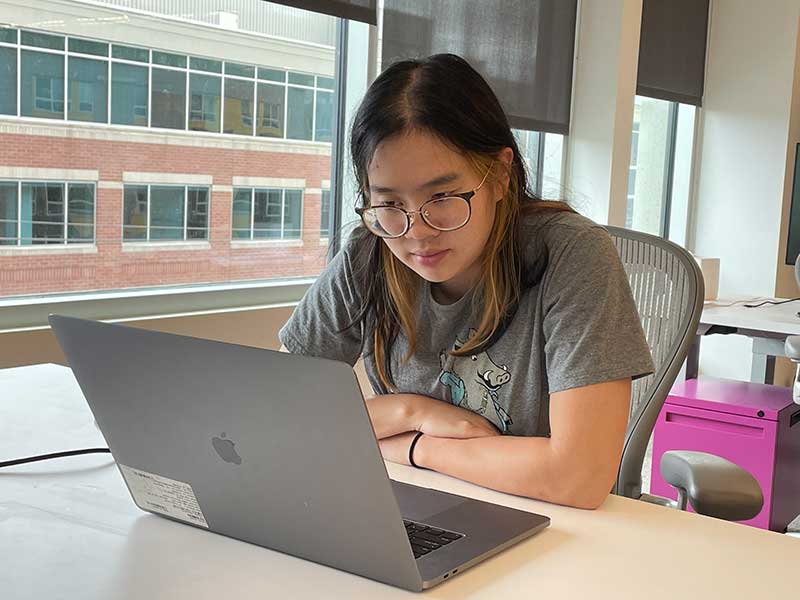Incoming doctoral student Millicent Li wins National Science Foundation fellowship
Incoming doctoral student Millicent Li wins National Science Foundation fellowship
Author: Tracy Miller Geary
Date: 07.18.22
Millicent Li, an incoming Khoury College of Computer Sciences doctoral student, has been awarded the prestigious National Science Foundation (NSF) Graduate Research Fellowship. It is the country’s oldest fellowship program directly supporting outstanding graduate students in STEM, and the NSF receives approximately 12,000 applications for 2,000 fellowships.
“I was visiting a few friends in the Bay Area and had just gotten back from our trip from Big Sur,” Li said. “We were at the airport and I saw the news on my phone and found that I had actually won the fellowship. I was elated!”

Her proposal involves elements of healthcare, natural language processing (NLP) and human-computer interaction (HCI), particularly creating solutions that bridge the gap between AI’s lofty aspirations and the actual utility medical practitioners want.
“I envisioned working on improving trust in how medical practitioners, such as radiologists, interpret decisions made by AI,” Li said. “Since medical applications tend to require more trust between AI and human users, it’s important to provide some kind of explanation for the decisions that AI might make.” Li noted that the recipients of the NSF fellowship are chosen not just on the strength of their proposals, but by their achievements as well.
While pursuing an undergraduate degree in computer science at the University of Washington, Li worked on many hardware and ubiquitous computing (ubicomp) projects.
“One influential project used facial arteries to do continuous blood pressure prediction. This is a tricky task because arteries in the face are thin and don’t give much of a signal, so doing a lot of signal processing is required,” Li said. “In the operating room, detecting heart rates through facial arteries can be advantageous in surgeries that only give you facial arteries. Furthermore, quick detection of blood pressure drops can make a huge difference in the surgery.”
While an undergraduate, Li held internships at high-profile companies, including Microsoft, Google, and Expedia. During her two summer stints at Google, she first worked on back-end work, then moved to ranking systems for Google Assistant. It was after her second summer at Google that she decided to go to graduate school, but she wasn’t sure what research area to pursue. A subsequent internship with the Microsoft Research Biomedical NLP team helped her realize she was interested in the intersection of NLP and healthcare.
Li was accepted into Northeastern in 2021 but deferred her acceptance for one year to work as an AI Resident at Meta (formerly Facebook) researching natural language processing. The program let her spend time working with mentors who helped her design a research question and explore her interests. Most recently, she has focused on understanding large language models and how to extract more information from them.
Li will continue at Meta through the summer, and said she could see herself returning there at some point. She noted that “I do enjoy the work that I’m doing and the freedom that I have alongside this work.”

At Northeastern, Li will work with her advisor, Byron Wallace, and connect with others who share her research interests.
“When I was looking at PhD programs, his goals for his research and mine were really related, so I thought we were a good match,” Li said. “I, like Byron, believe in applications-based research, and so healthcare was a natural area … I’m definitely open to more interdisciplinary research work, too.”
“Millicent is poised to do groundbreaking work at the intersection of natural language processing, healthcare, and human–computer interaction,” Wallace said. “Her selection for the NSF Graduate Student Research Fellowship reflects the promise of this interdisciplinary research direction, and her very apparent potential as a researcher well positioned to execute such work.”
Because Li’s interests have changed over time, she’s lived in worlds ranging from NLP to healthcare to HCI to ubicomp and learned what each area is lacking.
“People tend to push the boundaries for what works in NLP, but never think about how deployable these systems actually are,” she said. In healthcare, she’s found that a lot of systems aren’t made for a diverse body of users. In HCI and ubicomp, she’s seen that “there isn’t as much work in the space of integrating AI with HCI to build systems that people trust.”
While Li believes that AI will not replace human care, she does hope people will become more trusting of the benefits of AI in healthcare.
“I think the word ‘trust’ has been thrown around a lot in these research areas recently, and because of how impractical to deploy these AI systems tend to be, it’s become more popular of an issue to observe,” she said. “Trust is just one formalism I’ve used to tie NLP, HCI, and healthcare together, but I’m sure there are many more that I’m excited to explore.”
Subscribe to the Khoury College newsletter
The Khoury Network: Be in the know
Subscribe now to our monthly newsletter for the latest stories and achievements of our students and faculty